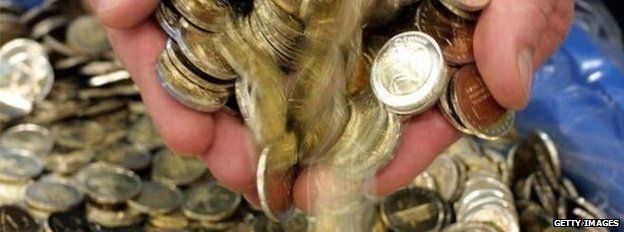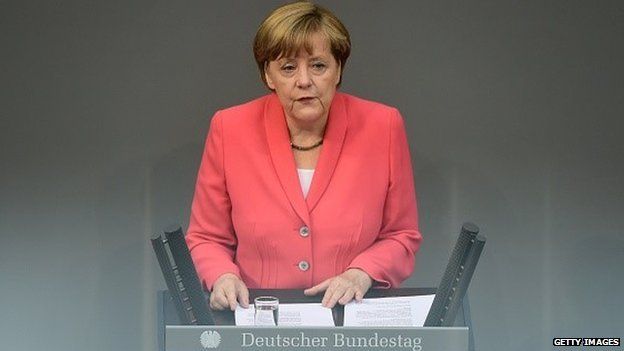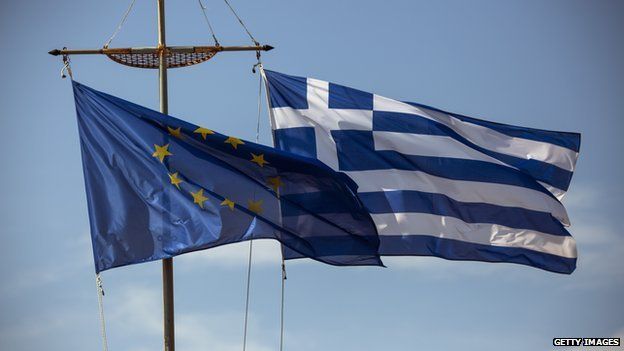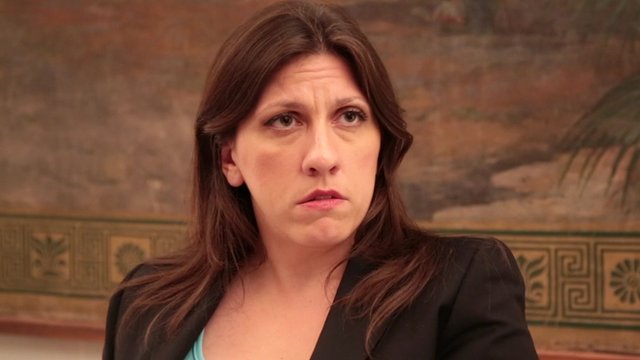
IMF Managing Director Christine Lagarde speaks about the state of the US, Greek and global economy during a press conference at IMF Headquarters in Washington, DC, June 4, 2015. AFP PHOTO / SAUL LOEB (Photo credit should read SAUL LOEB/AFP/Getty Images)
Greece in default if debt deadline missed, says Lagarde
BBC
International Money Fund boss Christine Lagarde says there is “no period of grace” for Greek debt repayment.
She said Greece would be in default with the IMF on 1 July it if fails to make a repayment on 30 June.
“I hope it is not the case, I really do,” Mrs Lagarde said after a meeting with the Luxembourg finance minister.
Earlier, German Chancellor Angela Merkel had said she was “still convinced” that a Greek debt deal was possible.
She said she thought Greece could reach an agreement with its creditors – the EU, the International Monetary Fund and the European Central Bank.
Mrs Merkel also told the Bundestag that Germany was working hard to keep Greece in the euro, but said Athens had to follow through on reform commitments.
“I’m still convinced – where there’s a will, there’s a way,” she said.
“If those in charge in Greece can muster the will, an agreement with the three institutions is still possible.”
‘Commitments’
Mrs Merkel added: “In February there was an agreement – the Greek government pledged to carry out structural reforms, and that must be done.”
In February, she said, Greece had also “agreed to fulfil its commitments to bondholders”.


Greece – deal or no deal?
- Option 1: No deal: Greece defaults on IMF and ECB repayments; ECB pulls plug on emergency bank assistance leading to run on Greek banks, capital controls and potential Grexit
- Option 2: Greece agrees reform deal with creditors at last minute and avoids default, staying in euro
- Option 3: No deal reached but both sides paper over cracks and Greece stays in euro for now
Greece has two weeks remaining to strike a deal with its creditors or face defaulting on an existing €1.6bn (£1.1bn) loan repayment due to the IMF.
The country has already rolled a €300m payment into those due on 30 June.
Peston: Will ECB keep Greece afloat?
Walker: The options for Greece
What impact would Grexit have on UK?

She was speaking ahead of a meeting of eurozone finance ministers in Luxembourg on Thursday.
Greece has less than two weeks left to reach a debt deal or face defaulting on an existing €1.6bn (£1.1bn) loan repayment due to the IMF.
The country has already rolled a €300m payment into those due on 30 June.
The European Union’s commissioner for economic affairs, Pierre Moscovici, said the meeting would be “very difficult” but he hoped everyone would turn up “with cool heads and the political will to succeed”.
‘Compromising mood’
Greece’s chief negotiator and junior foreign minister, Euclid Tsakalotos, told the BBC Radio 4 Today programme that any deal had to be one that was economically feasible.
“A couple of weeks ago, we presented our ideas, which we thought was the common ground of the negotiations of the last two or three months,” he said.
“We think that we have been in a compromising mood, we’ve been suggesting ideas, whereas the institutions presented a paper that was very close to their original bid.



“So what we are saying is that further compromises can be made, we can search for common ground, but the end product of what we agree on reforms, on the financing for the future, on the investment programme must be economically feasible.”
He also said the country must be able to keep its fiscal promises.
Mr Tsakalotos added: “So if we agree for a fiscal surplus of 1% this year and 2% next year, then I have to be able to tell [the Greek prime minister] that we can meet that, not that we’re going to have more recession that will make those targets unfeasible, and then the Europeans will come back and say: ‘You can’t talk to the Greeks because they never deliver their promises’.”

Angela Merkel addressed the Bundestag on Thursday over the Greek issue
Earlier, Mr Tsakalotos told Reuters news agency that without help, Greece would be unable to meet its obligations to the IMF on 30 June.
“At the moment, we haven’t got the money,” he said.
Reform demands
Greek Finance Minister Yanis Varoufakis said the country had a “political and moral duty” to reach an agreement with creditors over its debt crisis.
But he said Thursday’s meeting of eurozone finance ministers was unlikely to bring an immediate solution.
In return for more funding, creditors want further reforms from Greece.
But the ruling Syriza party is resisting those demands and, with talks deadlocked, fears are growing that Greece may default on its debts.
The European Commission, the European Central Bank (ECB) and the International Monetary Fund (IMF) could extend fresh finance, but are insisting on reform and further austerity measures.

Mr Varoufakis, when asked if there could be an agreement at the meeting of eurozone finance ministers in Luxembourg on Thursday, said: “I do not believe so.”
“Tomorrow we will set the scene for what we consider to be our political and moral duty, and that is to reach an agreement very, very quickly with our partners and the institutions,” he said.
‘Painful course’
On Wednesday, Greece’s central bank warned that the country could be on a “painful course” to default and exit from both the eurozone and the EU.
The Bank of Greece also warned that the country’s economic slowdown would accelerate without a deal.
“Failure to reach an agreement would… mark the beginning of a painful course that would lead initially to a Greek default and ultimately to the country’s exit from the euro area and, most likely, from the European Union,” it said in a report.
The bank added that about €30bn was withdrawn from Greek bank deposits between October and April.
Greek Prime Minister Alexis Tsipras is set to travel to the St Petersburg International Economic Forum in Russia on Thursday and is scheduled to hold talks with President Vladimir Putin on Friday.
BBC Europe correspondent Chris Morris says that both Greece and its creditors appear to be waiting for the other side to make the next move – and all the while the risk of miscalculation, or of waiting too long, increases.


Greek debt talks: main sticking points
- Greece will not accept cuts to pension payments or public sector wages, saying two-thirds of pensioners are either below or near the poverty line
- International creditors want pension spending cut by 1% of GDP – it accounts for 16% of Greek GDP. They say their target is early retirement not individual pensions
- EU officials say Greece has agreed to budget surplus targets of 1% of GDP this year, followed by 2% in 2016 and 3.5% by 2018. Greece says nothing is agreed until everything is agreed
- Creditors also want a wider VAT base; Greece says it will not allow extra VAT on medicines or electricity bills
- Greece complains creditors focus on increasing taxes instead of cracking down on tax evasion; IMF is concerned Athens is not offering credible reforms
EU solidarity damaged by Greek splits

Tensions between the two sides became clear on Tuesday during a news conference held by European Commission President Jean-Claude Juncker.
Mr Juncker, who had been seen as more sympathetic to the Greek government, said that Athens was responsible for the deadlock.
“I am blaming the Greeks for telling things to the Greek public which are not consistent with what I told the Greek prime minister,” he said.
Mr Tsipras did call Mr Juncker on Wednesday and they agreed to talk further, but did not set a date, according to the AFP news agency.
On Wednesday, Andreas Scheuer, the secretary-general of Germany’s CSU party, said the Greek government had not “realised the seriousness of the situation yet”.
In an interview with the Rheinische Post newspaper, he said: “They are behaving like clowns sitting in the back of the classroom, although they have received explicit warnings from all sides that they might fail to pass to the next grade.”
On Wednesday, German Foreign Minister Frank-Walter Steinmeier said Greece did not want to present new proposals at Thursday’s meeting of finance ministers, which “means time is even more pressing”.
Greek shares fell sharply again on Wednesday. The Athens General Index closed 3.2% lower, taking its loss for the past four trading sessions to almost 19%.
Greece in numbers
€320bn
Greece’s debt mountain
€240bn
European bailout
- €56bn Greece owes Germany
- 177% country’s debt-to-GDP ratio
- 25% fall in GDP since 2010
- 26% Greek unemployment rate

